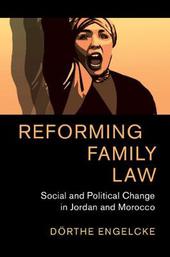
|
Reforming Family Law: Social and Political Change in Jordan and Morocco
Hardback
Main Details
| Title |
Reforming Family Law: Social and Political Change in Jordan and Morocco
|
| Authors and Contributors |
By (author) Doerthe Engelcke
|
| Series | Cambridge Middle East Studies |
|---|
| Physical Properties |
| Format:Hardback | | Pages:284 | | Dimensions(mm): Height 235,Width 156 |
|
| ISBN/Barcode |
9781108496612
|
| Classifications | Dewey:346.5695015 |
|---|
| Audience | | Professional & Vocational | |
|---|
| Illustrations |
Worked examples or Exercises
|
|
Publishing Details |
| Publisher |
Cambridge University Press
|
| Imprint |
Cambridge University Press
|
| Publication Date |
7 March 2019 |
| Publication Country |
United Kingdom
|
Description
As the only area of law that is still commonly termed 'Islamic law', family law is one of the most sensitive and controversial legal areas in all Muslim-majority countries. Morocco and Jordan both issued new family codes in the 2000s, but there are a number of differences in the ways these two states engaged in reform. These include how the reform was carried out, the content of the new family codes, and the way the new laws are applied. Based on extensive fieldwork and rich in sources, this book examines why these two ostensibly similar semi-authoritarian regimes varied so significantly in their engagement with family law. Doerthe Engelcke demonstrates that the structure of the legal systems, shaped by colonial policies, had an effect on how reform processes were carried out as well as the content and the application of family law.
Author Biography
Doerthe Engelcke is a senior research fellow at the Max-Planck-Institut fur auslandisches und internationales Privatrecht, Germany. She received her Ph.D. from St Antony's College, University of Oxford, in 2015 and was the co-winner of the 2016 BRISMES Leigh Douglas Memorial Prize for the best Ph.D. dissertation on a Middle Eastern topic awarded by a British University. Engelcke has held fellowships at the Islamic Legal Studies Program at Harvard Law School and the Lichtenberg-Kolleg, the Goettingen Institute of Advanced Study.
Reviews'With a highly engaging writing style, Doerthe Engelcke takes us into the heart of family law reform in Jordan and Morocco. She shows how these two seemingly similar monarchies faced similar problems at the same time and yet ended with very different results. The book blends the best of political science, law, and anthropology with incisive analysis and insights from extensive fieldwork.' Kristen Stilt, Harvard University, Massachusetts and author of Islamic Law in Action 'Engelcke's comprehensive approach ... shows that a different history marked by a distinct break with past foreign dominations - the Ottomans, French or British colonial rule - has shaped the current legal and judicial system ... Engelcke's book is an important and most welcome contribution to the understanding of law making and reform processes in Arab monarchies as well as republics in the Middle East and North Africa.' Irene Schneider, University of Goettingen 'Based on an award winning doctoral thesis, Reforming Family Law provides a remarkable insight into the mechanics and reasons for the relative successes and failures of the efforts to reform family law in Morocco and Jordan. Based on meticulous fieldwork in both countries, it sets out clearly and persuasively how and why Morocco was able to liberalise successfully its family code in 2004 when efforts to achieve the same in Jordan over the same period fell short despite the two countries having so much in common. Engelcke deftly explores and explains the various factors that influenced the process in the two states producing a study that makes not only a major contribution to the study of legal reform in the Arab world but also offers valuable perspectives on gender, society, governance and politics in the region.' Michael Willis, University of Oxford 'Even a casual reader will be impressed by the depth of the research and the breadth of the expertise on display in this book. But a careful reader will be even more profoundly rewarded. Engelcke provides a model of how to study family law, carefully examining the text without ever losing sight of the political and historical context. In understanding the diverse ways laws work - and how they might be changed - she shows how we need to integrate our understanding of what the law says with the surprising complexities of how it developed over time and who is deploying it today.' Nathan Brown, George Washington University 'Reforming Family Law will be a great resource to Middle East studies scholars. It is clear that the book is the result of meticulous research ... And one of the strengths of the book comes from the semi-structured interviews with judges, clerks, and members of religious and civil government units, women's groups, and Islamist organizations that animate and challenge state narratives about family law reform. The book will prove generative in both undergraduate and graduate seminars on the Middle East and North Africa.' Eda Pepi, International Journal of Middle East Studies
|